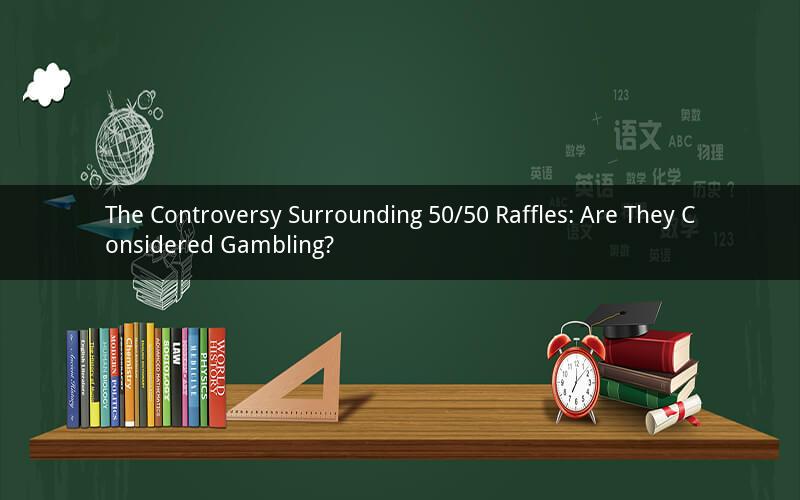
Introduction:
The 50/50 raffle, a popular fundraising method used by various organizations, has sparked a debate among enthusiasts and legal authorities alike. While some argue that it is a harmless and enjoyable form of entertainment, others claim it constitutes gambling. This article delves into the controversy surrounding 50/50 raffles and explores whether they should be considered gambling.
1. Understanding the 50/50 Raffle:
A 50/50 raffle is a type of lottery where participants buy tickets, and the proceeds are split equally between the winner and the organization hosting the event. The winner is determined by a random drawing, often at the end of the event. The concept is simple and has gained immense popularity due to its perceived fairness and ease of organization.
2. The Argument for 50/50 Raffles as Non-Gambling:
Advocates of 50/50 raffles argue that they should not be classified as gambling for several reasons. Firstly, they claim that the primary purpose of a 50/50 raffle is to raise funds for a charitable cause, rather than to provide a gambling experience. Secondly, participants have a fair chance of winning, as the outcome is determined randomly. Lastly, the prize is usually not substantial, making it more of a fun activity than a serious gambling endeavor.
3. The Argument Against 50/50 Raffles as Gambling:
Opponents of 50/50 raffles argue that they should be considered gambling due to certain characteristics that align with the definition of gambling. Firstly, participants engage in a form of betting by purchasing tickets, with the expectation of winning a prize. Secondly, the outcome of the raffle is determined by chance, which is a key element of gambling. Lastly, the potential for addiction and financial harm cannot be overlooked, as individuals may become excessively involved in trying to win.
4. Legal Perspectives on 50/50 Raffles:
The classification of 50/50 raffles as gambling varies from one jurisdiction to another. In some places, they are explicitly allowed, while in others, they are prohibited or regulated. Legal authorities often consider factors such as the nature of the event, the organization hosting it, and the potential for abuse. For example, some jurisdictions require 50/50 raffles to be conducted by registered charities or to adhere to specific regulations.
5. The Impact of 50/50 Raffles on Charities:
Regardless of their legal status, 50/50 raffles have become a significant source of funding for many charities. They provide a cost-effective and accessible means for organizations to raise money for various causes. However, the controversy surrounding their classification as gambling raises concerns about the potential negative consequences, such as increased scrutiny and restrictions on fundraising activities.
Questions and Answers:
1. Q: What is the main difference between a 50/50 raffle and a traditional lottery?
A: The main difference lies in the distribution of the proceeds. In a 50/50 raffle, half of the proceeds go to the winner, while the other half is used for the organization's cause. In a traditional lottery, all the proceeds are typically used for prizes and the organization's profit.
2. Q: Can individuals purchase multiple tickets in a 50/50 raffle?
A: Yes, individuals can purchase multiple tickets in a 50/50 raffle. However, some jurisdictions may have limitations on the number of tickets an individual can purchase to prevent excessive gambling.
3. Q: Are there any age restrictions for participating in a 50/50 raffle?
A: Yes, many jurisdictions require participants to be of legal age, which is typically 18 or 21, depending on the location. This is to ensure that individuals are of legal age to engage in gambling activities.
4. Q: Can a 50/50 raffle be conducted online?
A: The legality of online 50/50 raffles varies by jurisdiction. In some places, they are permitted as long as they comply with specific regulations. However, in others, online raffles may be prohibited or restricted.
5. Q: How can organizations ensure that their 50/50 raffles are conducted legally?
A: Organizations should consult with legal authorities or seek guidance from a lawyer to ensure compliance with local laws and regulations. This may involve registering the raffle, adhering to specific rules, or obtaining necessary permits.
Conclusion:
The debate over whether 50/50 raffles should be considered gambling is a complex issue. While some argue that they are a harmless and enjoyable fundraising method, others believe they share key characteristics of gambling. Understanding the legal perspectives and potential impacts on charities is crucial in determining the appropriate classification and regulation of 50/50 raffles.